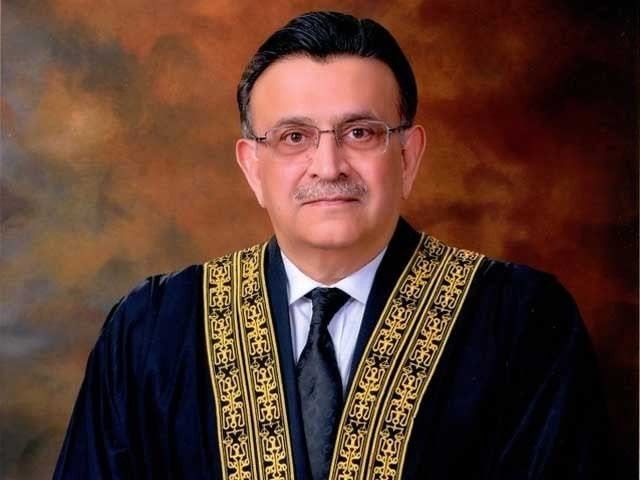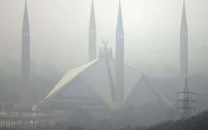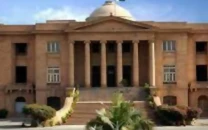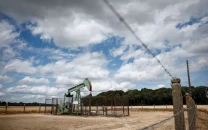CJ for smooth sailing of Article 95 process
AGP submits undertaking, says no lawmaker can be physically restricted from exercising his right to vote

Chief Justice of Pakistan Justice Umar Ata Bandial on Monday observed that there should be no interference to halt the process of invoking Article 95 of the Constitution that governs the procedure related to tabling a no-confidence motion against the incumbent prime minister. “The purpose of the proceeding is that the right [to cast vote] of lawmakers must not be defeated," said Justice Bandial.
A division bench of the apex court comprising Justice Bandial and Justice Munib Akhtar was hearing a petition of the Supreme Court Bar Association (SCBA) that sought intervention of the apex court to prevent "anarchy" in the federal capital on the day of the no-trust vote. The SCBA requested the court to restrain “political parties from holding public meetings in Islamabad before voting on the no-confidence motion”.
The petition had also prayed the court to stop government agencies from arresting or detaining lawmakers and to stop public gatherings in the federal capital which prevented the assembly members from reaching parliament. During the hearing, senior opposition leaders including PML-N President Shehbaz Sharif, PPP Chairman Bilawal Bhutto Zardari and PDM President Maulana Fazlur Rehman were present in the courtroom.
READ Read More: No-confidence motion to be tabled after long march: Shah
Senior opposition and ruling party leaders also attended the court proceedings. Different parties’ lawyers also came to witness the proceedings. At the outset of the proceedings, Attorney General for Pakistan Khalid Jawed Khan gave an undertaking, stating that no lawmaker could be physically restricted from exercising his right to vote. The top government law officer also assured the court that no lawmaker would be arrested for exercising this right.
Unlike the announcement made by some federal minister, the AGP assured the bench that mobs would not be allowed to assemble outside the Parliament House on the voting day. He also contended that there is no substance in the allegation that the incumbent government was involved in horse trading.
The AGP agreed with the SCBA prayers mentioned in its petition except for one plea wherein the bar requested the Supreme Court to direct the National Assembly speaker to discharge his duties, perform his functions and dispose of the proceedings on the motion of no-confidence against the prime minister strictly in accordance with the “Constitution and the Rules of Procedure and Conduct of Business in the National Assembly, 2007”.
The AGP was of the view that the prayer was linked with the presidential reference filed under Article 186 of the Constitution, seeking interpretation of Article 63 A of constitution. The bench, however, appreciated the AGP’s assurance regarding completion of the no-confidence motion under Article 97 of Constitution.
During the hearing, counsel for SCBA Mansoor Awan, referring to Article 54, stated that National Assembly Speaker Asad Qaiser was delaying the matter, adding that the speaker was bound to summon the parliament’s session within 14 days, but he delayed it and called the session on March 25.
Even Farooq H Naek, counsel for the Pakistan Peoples Party (PPP) contended that the NA speaker had subverted the Constitution by not summoning the session within 14 days in view of Article 54.
Read Opp mulls 'Plan-B' if no-confidence fails
The bench refused to intervene in the matter concerning the delay of the National Assembly session by the speaker. It advised the counsels representing the opposition leaders to raise the matter in parliament. The chief justice said “These are internal proceedings of parliament.”
During the hearing, Justice Munib Akhtar observed that voting right of an individual MNA “is not absolute in view of Article 66”.
Justice Akhtar, referring to Article 17, said that the right of political parties were protected.
He said that according to Article 95(ii), which deals with the procedure to bring in a no-confidence motion against the prime minister, a member's individual vote had "no status", adding that the court had previously made similar observations in cases related to former prime ministers – Benazir Bhutto and Nawaz Sharif.
After joining a political party, a member's vote was considered a "collective" right, he added.
However, the chief justice made it clear that there should no restriction on MNAs to exercise their vote.
The chief justice also asked the Inspector General Islamabad as what steps have been taken regarding the Sindh House attack by PTI workers. The IG submitted that Section 144 has imposed in the Red Zone area. He also regretted on the incident.
In a reference to the attack on the Sindh House by PTI workers, the court said it expected that the Sindh government’s version will also be included in FIR. The bench refused to accept opposition parties plea that the SCBA should be allowed to play as mediator between the government and them for holding the peaceful process of Article 95 of constitution. Advocate General Sindh Salman Talibuddin said that the government functionaries are inciting people for violence.



















COMMENTS
Comments are moderated and generally will be posted if they are on-topic and not abusive.
For more information, please see our Comments FAQ